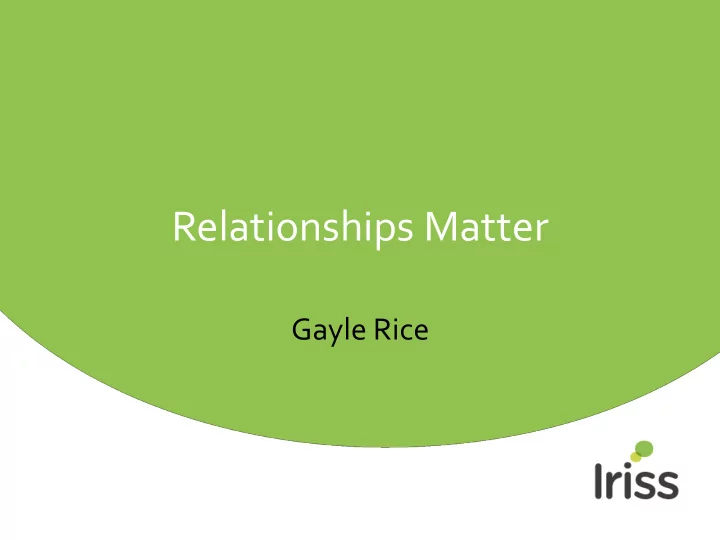

Relationships Matter Gayle Rice
Welcome • Iriss • Relationships Matter project • Outputs • Outcomes • The future
Iriss is a third sector organisation promoting positive outcomes for the people supported by Scotland ’ s social services
Our mission To promote positive outcomes for the people who use Scotland’s social services by enhancing the capacity and capability of the social services workforce to access and make use of knowledge and research for service innovation and improvement.
Our vision A high quality, continually improving social services sector renowned for its effective use of knowledge and research-based innovation.
Our strategic outcomes • embed a culture of collaboration, open to new ideas • ensure everyone has the knowledge, tools and skills to effectively use evidence and to innovate • place people at the centre of the design of services and support
Leaving care • Transitions in life can be complex • This transition can contribute to a feeling of isolation, loneliness and depression • Research indicates that young people with care experience are at risk of becoming socially excluded and vulnerable members of society
Supporting young people • Relational-based practice recognises the influence of relationships on the effectiveness of interventions • The continuity of consistent relationships is important • Young people say they would benefit from positive, nurturing relationships
Barriers
JAM
Attendees A group of inspirational practitioners and young people who were brave enough to challenge, and confident enough to promote, continued relationships between practitioners and young people as they leave care
Attendees • 5 front line organisations : Kibble, Falkirk Council, Hot Chocolate Trust, Includem, Care Visions • Approx. 25 frontline practitioners: managers, youth, residential and transitional workers • Approx. 25 care experienced young people • 4 intermediaries
Outputs 1. Videos and audio about what love means in a professional setting to young people and practitioners 1. Business strategy to address instances where colleagues may judge one another when keeping in contact with young people
Outputs 3. New meeting that support practitioners and young people which give them permission to stay in contact with one another 4. New policies and job descriptions for residential workers which prioritise relational based practice
Outputs 6. New process which gives practitioners permission to encourages young people to keep in contact with staff 6. New website
Outputs 8. Conversation Tool 9. Dissemination of work by members of the collective at conferences and in publications
Outcomes
Outcomes What difference has this activity made to practitioners? “We’re beginning to open minds, allowing a more natural experience of care, and creating safety” “We have a ‘can do’ attitude and an expectation that it’s ok to keep in touch. We have an expectation that all young people will be welcome and be part of Tremanna and openly communicate any issues”
Outcomes “We changed how we process things as a team – I have noticed a change in how team members speak about their work (especially challenges) more compassionately by asking questions about why a young person may have been struggling in a session” “Additional support, employment opportunities and continued positive relationships” “This is not a project for us, we are developing our culture”
The future 1. Continuing relationships can feel like ‘the right thing to do’ but also ‘ takes a lot of courage’ 2. It’s important to challenge and question ‘standard practice’ in terms of its impact on young people: “Think how traumatic ‘standard practice’ may be for young people” “We are talking about our practice but we are also talking about young people’s lives”
The future 3. Practitioners can benefit just as much as young people when relationships are built and sustained: “It’s not a case of give... you get a lot back too” 4. Continuing relationships with young people leaving care can involve questioning what ‘ being professional ’ means: “ If you are not touched, moved and shaped by people you work with how professional are you?”
The future 5. It’s important that when promoting a change in culture to support lasting relationships and that it is not seen as ‘tick - box’ : “ There is a myriad of ways to make relational- based practice the norm. There is a danger that concrete examples mean people think that is what they need to do. Changes need to be contextually and relationally relevant and people need to be open to challenge their practice ”
The future 6. It’s important to question and challenge the impact of ‘ protective measures ’ on relational -based practice and continuing relationships with young people: “We need to be careful that we don’t dress up protective measures for professionals so they are unable to form relationships with young people...the policies and structures we create, presented as ways to keep young people safe, are more about risk-averse practice and protecting agencies and staff…”
http://blogs.iriss.org.uk/relationships-matter/
Thank you www.iriss.org.uk http://blogs.iriss.org.uk/relationships-matter/ gayle.rice@iriss.org.uk
Recommend
More recommend